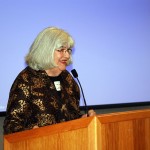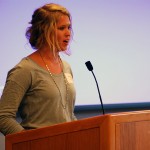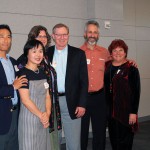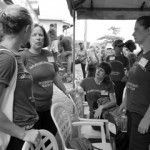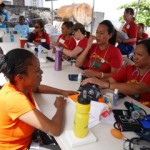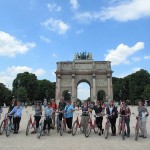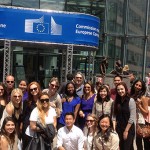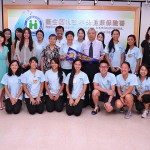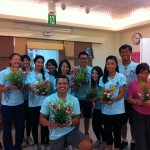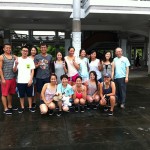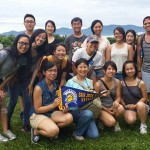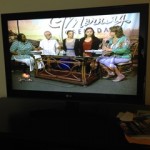Helen L. Stevens, retired director of International Programs and Services, honored three San José State University faculty members with the Helen L. Stevens Outstanding International Educator Award, including two professors from the College of Applied Sciences and Arts. This year’s winners include Linda Levine, of Health Science and Recreation, Tamara McKinnon, of the Valley Foundation School of Nursing, and Yasue Yanai, of World Languages and Literatures.
“I was one person who came from the mountains and had never even been to New York City,” Stevens said. “But I ended up in Pairs. It took a while to put together what I heard in Paris with what I heard in (French class.) It changed my life forever and ever.”
- Helen Stevens introduced each of the three recipients to receive the Helen Stevens Outstanding International Educator Award on Oct. 21, including two professors from the College of Applied Sciences and Arts.
- Aly Mauro, an Occupational Therapy student, talked about her experience on a faculty-led program with Tamara McKinnon, a nursing professor who was one of three faculty members to win the Helen Stevens Outstanding International Educator Award on Oct. 21.
- Winners of the Helen Stevens Outstanding International Educator Award posed for a picture at the award reception with their husbands. Yasue Yanai, second from left, Tamara McKinnon, third from left, and Linda Levine, far right, were selected for recognition for their outstanding efforts to provide a global education to SJSU students.
The three recipients of the Helen L. Stevens Outstanding International Educator Award all shared a common thread this year – they have created opportunities for students enrolled at SJSU to spend time abroad to gain that same life-changing experience Stevens described many years ago.
“It was so difficult to select one winner, we upped the ante to award three,” Stevens said, of the 28 nominees. “Even though we had two more awards than usually it was still hard. It’s one of the pleasures of working at a university with so many outstanding faculty.”
At the event this year, organizers invited three students to talk about their international experience with each of the awardees.
Aly Mauro, an Occupational Therapy student, a program in Grenada for nursing and OT students with McKinnon that focused on community health.
“Her laid-back demeanor put us all at ease,” Mauro said, adding that she helped them keep their cool even when they were invited to do an impromptu radio interview. “She was pushy, yet protective, and it worked. She managed to teach us a tremendous amount in three weeks.”
Stevens described McKinnon’s first experience with international travel with a sense of humor as she said McKinnon’s global adventure started in a Tijuana jail, where she worked for an organization that worked in jails, orphanages and the city landfill. McKinnon has taken students to Ireland in addition to the summer 2014 trip to Grenada.
As she accepted her award, McKinnon thanked Stevens for the scholarships she awarded to a dozen CASA students who participated in faculty-led programs in summer 2014.
“Your scholarship, for some students, made the difference,” she said. “Thanks to our partner communities that trust us to come in and work with them as well as the students who put their trust in us.”
Jayne Balthazar traveled to Paris with award recipient Levine.
“It was the first time I earned a scholarship and traveled independently (of my family) and shared a room with someone I barely knew,” Balthazar said, noting that she also raised money on her own to take the trip.
She said Levine and her husband David Buseck, an SJSU professor and co-teacher of the program, helped the students navigate the city and learn many things.
“When we first arrived in Paris, we didn’t know how to use the Metro, but we had Linda and David there to help us.”
Stevens said her first interactions with Levine came when she was still the director of IPS when Levine facilitated retreats for her office. She said Levine helped the department learn to collaborate within the office and also with other departments on campus.
“When she and David proposed a faculty-led program in Paris there was not a doubt that it would be a truly successful program,” Stevens said.
Levine and Buseck continue to work with students who’ve accompanied them to Paris, with monthly invitations to their home to speak French and talk about French culture.
Levine’s love of travel started young as her parents were international tour directors. She said when her father passed away he had been to 132 countries.
“I know there are a lot of talented people and passionate people doing global works,” Levine said. “Any of those people could have easily been chosen for their outstanding work.”
Amy Strage, the assistant vice president for Faculty Development, served as an emcee at the event.
“Listening to everyone speak it occurred to me what qualities to look for in faculty,” she said. “We want faculty who are creative, demanding and supportive.”
She said McKinnon, Levine and Yanai each possess those traits.
For more on the international experiences students in College of Applied Sciences and Arts participated in last summer, visit:
